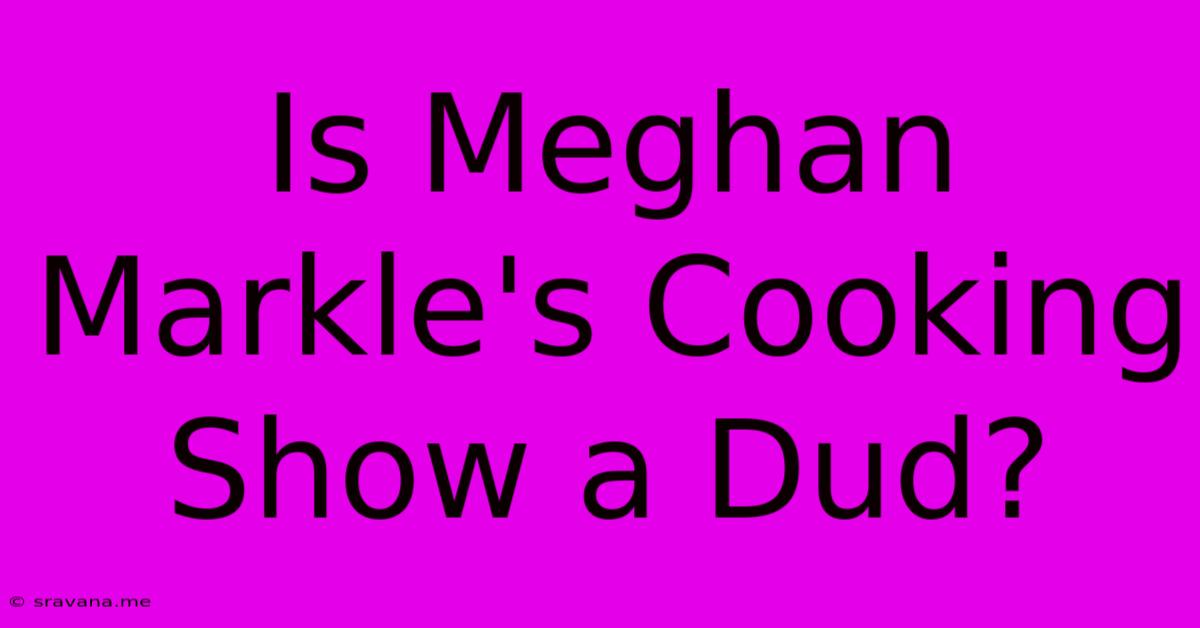Is Meghan Markle's Cooking Show A Dud?

Discover more detailed and exciting information on our website. Click the link below to start your adventure: Visit Best Website sravana.me. Don't miss out!
Table of Contents
Is Meghan Markle's Cooking Show a Dud? A Critical Analysis
Meghan Markle, the Duchess of Sussex, has captivated the world with her life, both before and after marrying into the British Royal Family. Now, with her rumored foray into the culinary world with a potential cooking show, many are questioning: will it be a hit, or a flop? This article delves deep into the potential success or failure of a hypothetical Meghan Markle cooking show, analyzing various factors contributing to its potential reception.
The Potential Appeal: Meghan's Brand and Audience
Meghan Markle already possesses a significant global audience, cultivated through years in the public eye. Her established brand, characterized by its focus on social impact, philanthropy, and a modern, relatable image, could translate well into a cooking show. A show focusing on healthy recipes, sustainable ingredients, or even community-based cooking could resonate strongly with her existing fanbase and attract a new audience interested in these themes.
Leveraging Existing Fanbase:
Her existing fanbase, a diverse group ranging from ardent supporters to those simply curious about her life, provides a pre-built audience ready to tune in. This built-in viewership is a substantial advantage, minimizing the initial struggle many new shows face in acquiring an audience.
Expanding Appeal Beyond the Existing Fanbase:
However, simply relying on her existing fanbase isn't a guaranteed path to success. To reach a wider audience, the show must offer something beyond her existing brand appeal. A cooking show featuring diverse cuisines, innovative recipes, or engaging storytelling could attract food enthusiasts even if they aren't already fans. The show would need to stand on its own merits as a compelling culinary program.
The Potential Pitfalls: Scrutiny and Expectations
Meghan’s life has been subject to intense media scrutiny. This level of public examination could translate into exceptionally high expectations for any venture she undertakes. Any perceived misstep, from recipe choices to on-screen persona, could be magnified and criticized.
Navigating the Media Landscape:
Successfully navigating the intense media scrutiny requires a strong production team that understands the unique challenges of producing a show featuring a high-profile figure like Meghan. Strategic public relations and a clear understanding of the target audience would be crucial to manage media narratives and build positive reception.
Managing Expectations:
The show's success hinges on managing unrealistic expectations. The show shouldn't attempt to be everything to everyone. Focusing on a specific niche within cooking – perhaps Californian cuisine or globally-inspired vegetarian dishes – could allow for a more focused and ultimately more successful product.
The Show's Format and Content: A Crucial Factor
The format and content of a potential cooking show are pivotal to its success or failure. A simple, straightforward demonstration format might appeal to a wider audience, while a more complex format with celebrity guests or elaborate challenges could risk alienating viewers.
Recipe Selection and Presentation:
The recipes chosen are crucial. Appealing to a broad audience means incorporating both familiar dishes and exciting, innovative recipes. Clear and concise instructions, visually appealing presentation, and achievable recipes (not requiring obscure, expensive ingredients) are essential for viewer engagement.
Engaging Storytelling:
Adding storytelling elements beyond just the recipes themselves could enhance the show’s appeal. Incorporating personal anecdotes, cultural insights related to the dishes, or interviews with food producers and artisans could create a richer viewing experience and appeal to a wider range of viewers.
Comparing to Successful Culinary Shows:
To analyze the potential for Meghan's success, we can compare her potential show to established culinary programs. A show with the warmth and approachability of "Barefoot Contessa" might be a good model to emulate, while avoiding the more competitive and dramatic formats seen in shows like "Top Chef." The key is to find a balance between informative, easy-to-follow content and engaging storytelling.
Learning from Successes and Failures:
Analyzing the successes and failures of other cooking shows can provide valuable insight into what works and what doesn't. Identifying the elements of successful shows – such as strong visual presentation, relatable personalities, and well-structured content – and avoiding the pitfalls of failed shows – such as overly complex recipes, unengaging hosts, and poor production values – will be crucial to Meghan's success.
Conclusion: Potential for Success or Failure
Whether Meghan Markle's cooking show would be a "dud" or a resounding success is uncertain. The potential for success is undeniably there, given her existing fanbase and the potential for a well-crafted, relatable show. However, navigating the challenges of intense media scrutiny and managing expectations are crucial. The format, content, and overall production quality will be vital determinants of its reception. Ultimately, the success hinges on creating a show that stands on its own merit, offering viewers something valuable and enjoyable, regardless of the host's identity. A show focused on well-produced recipes, engaging storytelling, and a genuine connection with the audience has the highest likelihood of success. Failure, however, would likely stem from a lack of focus, poor production quality, or an inability to connect with a broader audience beyond her established fanbase.

Thank you for visiting our website wich cover about Is Meghan Markle's Cooking Show A Dud?. We hope the information provided has been useful to you. Feel free to contact us if you have any questions or need further assistance. See you next time and dont miss to bookmark.
Also read the following articles
| Article Title | Date |
|---|---|
| Thousands Lose Aetna Oregon Health Coverage | Jan 04, 2025 |
| Nsa Billing Allegations Aetna Sues Radiology | Jan 04, 2025 |
| All About Meghan Markles Netflix Series | Jan 04, 2025 |
| Meghans Latest Instagram Prince Harrys Footage | Jan 04, 2025 |
| Meghan Markles Instagram Post A Harry Video | Jan 04, 2025 |
